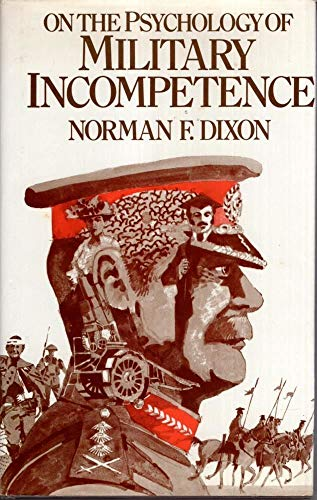
On the Psychology of Military Incompetence by Norman F. Dixon
My rating: 5 of 5 stars
At times like these, here in Europe at least, questions on how battles – and wars – are won or lost are existential. What do we need, in order to save ourselves?
It’s too tempting to reduce the question to just considering which side can get hold of the larger amount of energy – food and fuel for fighters and other citizens alike, energy to keep warm (or cool), and kinetic energy, in the form of ammunition, to throw at the foe.
This book is for people who want the whole story: the human factors which can make the crucial difference.
The author first takes us on a tour of some of the most well-known and notorious instances of incompetent military leadership: from the initial battles of the Crimean War, with British troops put ashore with neither shelter nor food in the teeth of ice-cold driving rain, through a century of catastrophic mismanagement, to Arnhem, where a single file of tanks on a narrow, raised road across 60 miles of boggy ground (ring any bells?) failed to reach their appointed place in the consequentially-unsuccessful Operation Market Garden.
After dismissing the popular explanation of straightforward stupidity as a factor (many of the leaders of disasters had other, successful, campaigns under their belts), we are left with, as the author puts it, ‘a case to answer’.
This ‘case’ takes us through a menu of psychological factors common to people who are attracted to, and who are good at getting promoted in, a military environment – but which then place them in an impossible position: the very qualities that got them to the top prove a liability when it comes to leading squads of real humans to perform unnatural feats in conditions of extreme stress.
Why, then, isn’t military incompetence more rife? And why, also, did the side on which Britain fought go on to win both the wars just mentioned? In some ways these two questions answer each other: we read on to find out about the psychological factors which rendered the opposition’s leaders in these two conflicts even more incompetent than our own!
But isn’t all this something of an insult to the majority military leaders who, under extraordinary stress and danger, nevertheless pull off incredible feats of leadership and bravery? Well, the author asks us not to take it as such. He wants, more than anything, to solve a problem, and stresses that in spite of all the psychological factors we explore with him, the incompetence is the exception rather than the rule.
As he delightfully puts it, devotees of the military should no more take offence at an analysis of one of the reasons why things can go wrong, as should “admirers of teeth complain about a book on dental caries”.
And what of this constellation of factors which come together to make for incompetent military leaders? Many of them can be seen all over the world, but some are uniquely British.
These latter – although this book was written nearly half a century ago now – still plague us on these islands. And I don’t mean among the military.
I’m a lifelong civilian, and a physicist rather than a psychologist or historian. And yet I found this read fascinating, and in places hauntingly familiar. Anybody, in the end, who has even the remotest interest in why they have ended up labouring under poor leadership, in Britain or elsewhere, would do well to read this book.
View all my reviews

